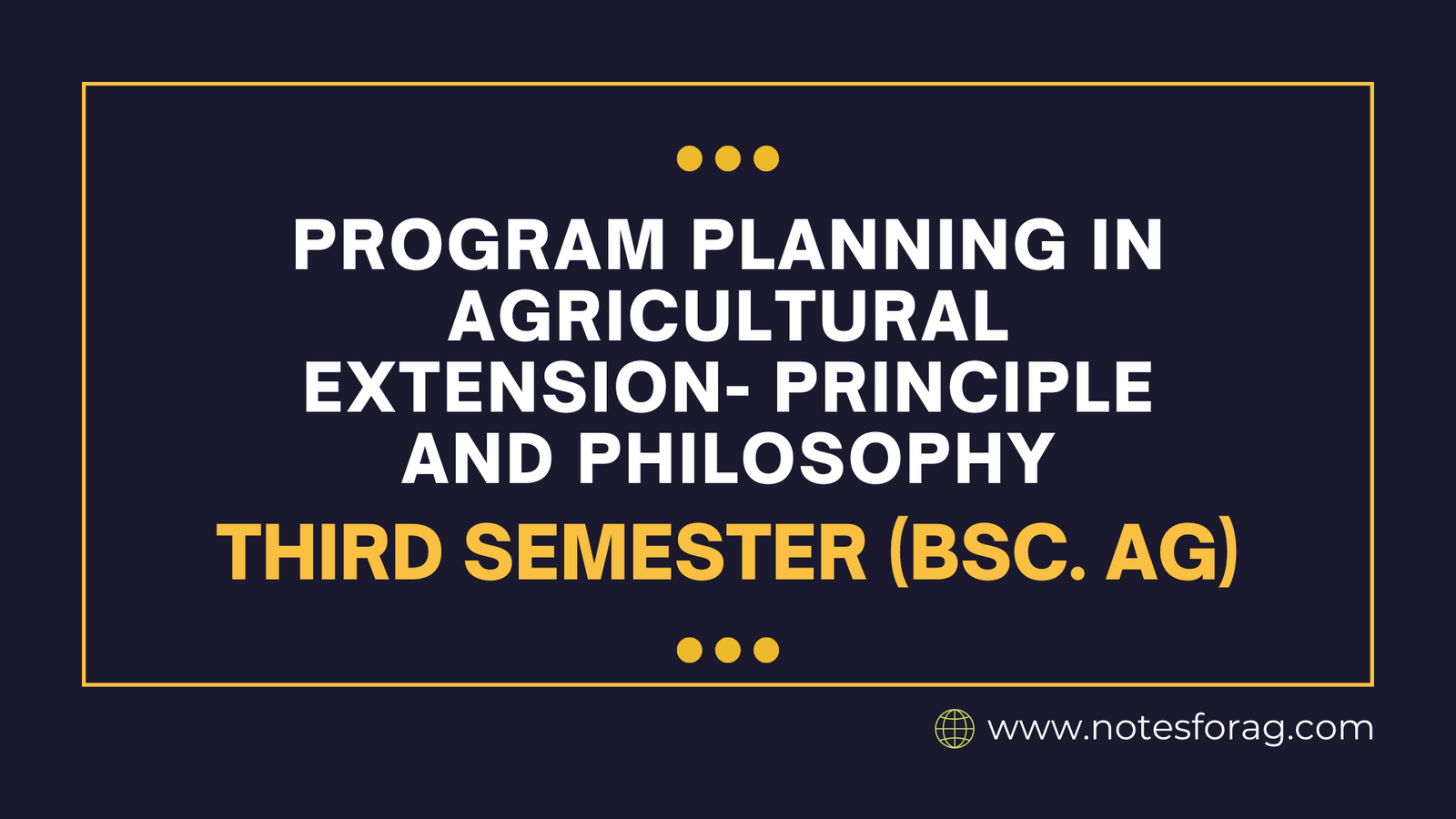Program Planning in Agricultural extension is guided by core ideas and a philosophy that emphasizes the necessity of being needs-driven, inclusive, adaptable, and sustainable. The principles emphasize community engagement, resource optimization, and integration with larger development efforts, while the philosophy emphasizes the importance of people-centered development, knowledge empowerment, and long-term sustainability. These aspects work together to ensure that program planning in agricultural extension are effective, relevant, and capable of bringing about long-term beneficial change in rural communities.
Table of Contents
Principles of Program Planning
Program planning in agricultural extension is guided by several fundamental principles that enhance its effectiveness and relevance to the target audience.
- Need-Based Approach: Program planning in agricultural extension should be based on the farming community’s specific requirements and challenges. Identifying and prioritizing these needs ensures that the program is relevant and successful in dealing with the most pressing concerns.
- Participation and inclusion: Farmers, community leaders, and extension workers should all take an active role in the planning process. This guarantees that varied opinions are taken into account, increasing the likelihood of community support and ownership of the program.
- Flexibility and adaptability: Programs should be flexible enough to adjust to changing circumstances, such as weather, market conditions, or community requirements. This guarantees that the program is both relevant and effective throughout time.
- Sustainability: Planning should stress long-term sustainability by encouraging ecologically friendly, economically feasible, and socially responsible behaviors. This guarantees that the program’s effects are felt long after it is implemented.
- Resource Optimization: It is critical to make the best use of available resources, including financial, human, and technological inputs. Programs should be designed to maximize the impact of these resources while guaranteeing efficient and effective utilization.
- Integration and coordination: Programs should be integrated into existing development programs and coordinated with local, regional, and national agriculture policy. This provides synergy and prevents duplication of effort.
- Monitoring & Evaluation: Continuous monitoring and evaluation should be included in the program to track progress, measure outcomes, and make required changes. This contributes to ensuring that the program accomplishes its goals and improves.
Philosophy of Program Planning
The concept of program planning in agricultural extension is based on the idea that agricultural growth should be people-centered, needs-driven, and sustainable. It is based on the premise that the most effective extension initiatives are collaborative, inclusive, and adaptive to local conditions. The philosophy underpinning program planning in agricultural extension is a multi-faceted endeavor that draws inspiration from various theoretical frameworks.
- Person-Centered Development: The ideology emphasizes the significance of including the community in all stages of the planning process. By focusing on people’s needs and goals, initiatives are more likely to be accepted by the community and result in significant, long-term change.
- Empowerment through Knowledge: Extension programs are viewed as a way to empower farmers and rural communities by equipping them with the knowledge, skills, and resources they require to enhance their agricultural practices and livelihoods.
- Sustainability and Stewardship: Sustainability is highly valued, both in terms of environmental care and the long-term viability of agricultural operations. The philosophy advocates for ways that strike a balance between current agricultural requirements and the preservation of resources for future generations.
- Collaboration & Partnerships: The idea emphasizes the value of collaboration among diverse stakeholders, including as farmers, extension workers, researchers, policymakers, and development organizations. Working together, these groups can develop more comprehensive and effective initiatives.
- Adaptation and innovation: The concept recognizes the importance of innovation and adaptation in the face of changing conditions. It promotes the adoption of new technology and approaches while preserving traditional knowledge and practices that have proven useful over time.
Program Planning in Agricultural Extension, informed by these ideas and philosophy, aims to build programs that are not only productive in the short term but also sustainable and useful to rural communities in the long run.
What is the philosophy behind program planning in agricultural extension?
The philosophy emphasizes people-centered development, with the goal of empowering farmers by satisfying their needs through knowledge and sustainable methods. It promotes collaboration among all stakeholders, encourages innovation while honoring traditional knowledge, and ensures that extension projects have long-term, positive impact in rural areas.
Why is the needs-based approach important in program planning for agricultural extension?
A needs-based approach guarantees that extension programs address farmers’ most pressing concerns. By focusing on real-world community challenges, the program becomes more relevant and effective, resulting in higher adoption rates and improved outcomes.
Related Articles

